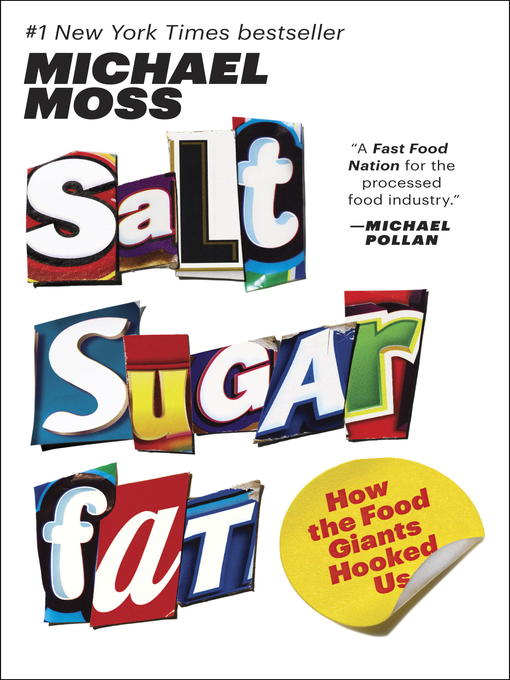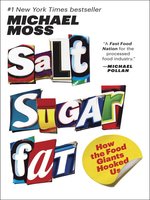-

January 7, 2013
American cuisine is just a delivery system for an addictive trinity of unhealthy ingredients, according to this eye-popping exposé of the processed food industry. Pulitzer-winning New York Times reporter Moss (Palace Coup) explains the two-faced science of salt, sugar, and fat, which impart tantalizing tastes and luscious mouthfeel that light up the same neural circuits that narcotics do—Coca-Cola, he notes, calls favorite customers “heavy users”—while causing epidemic obesity, cardiovascular disease, and diabetes. But he also crafts an absorbing insiders’ view of the food industry, where these ingredients are the main weapons in a brutally competitive war for stomach-share. He takes readers into the laboratories, marketing tests, and boardrooms where the sweet, salty, cheesy “bliss point” of cereals, snacks, sodas, and frozen dinners is obsessively pursued; the scientists and executives he talks to feel torn between health concerns—almost to a person, he observes, they avoid eating the food they sell—and the market-driven imperative to stoke consumer cravings. Moss’s vivid reportage remains alive to the pleasures of junk—“the heated fat swims over the tongue to send signals of joy to the brain”—while shrewdly analyzing the manipulative profiteering behind them. The result is a mouth-watering, gut-wrenching look at the food we hate to love.
-

Starred review from February 1, 2013
A revelatory look at America's increasing consumption of unhealthy products and at how the biggest food manufacturers ignore health risks, and employ savvy advertising campaigns, to keep us hooked on the ingredients that ensure big profit. In an era where morbid numbers of people are living with diabetes, obesity and high blood pressure, New York Times Pulitzer Prize-winning reporter Moss (Palace Coup, 1989) discovers through ardent research--much of it interviews with current and former executives of Kraft, PepsiCo and other massive conglomerates--that there is shockingly little regulation of the processes behind the design and sale of foods purposely laden with dangerous levels of salt, sugar and fat. As the average American works longer hours and spends more time outside of the home, the demand for easy-to-cook and tasty meals has skyrocketed. In response, food giants provide an enormous slate of processed food options, almost all of which require immense amounts of salt, fat and/or sugar to cover the taste of poor-quality ingredients. Pulling no punches, the author points out that the recent trend of "healthy" items is no loss for these food manufacturers, who capitalize on creating new lines of spinoff products labeled "low-salt" or "sugar-free," when in fact those products require a significant increase in one of the other triad of flavors to remain palatable. Many products are laden with these ingredients in ways that would surprise the consumer: A single cookie, for example, might require several servings' worth of undetectable salt to retain its irresistible crunch, while it also contains up to five teaspoons of sugar. Moss breaks down the chemical science behind the molecular appeal of these foods, as well as behind the advertising strategies that are so successful in getting consumers to buy not only the "healthier" versions of popular foods, but the originals, as well. If this trend is to be reversed, he argues, it might take a social revolution of empowered consumers, a goal within reach if accurate information is available and pressure is put on these companies to dramatically alter the contents of its processed foods. A shocking, galvanizing manifesto against the corporations manipulating nutrition to fatten their bottom line--one of the most important books of the year.
COPYRIGHT(2013) Kirkus Reviews, ALL RIGHTS RESERVED.
-

October 15, 2012
A Pulitzer Prize-winning investigative reporter at the New York Times, Moss delivers an indictment of the processed-food industry. In fact, he's been doing that pretty regularly in the pages of the Times, with challenges to USDA Food Safety Practices and stories of tainted meat that make your stomach clutch. Here, he takes the Big Three--salt, sugar, and fat--and shows how the food industry has used these basic, inexpensive ingredients to get us actually addicted to food we don't need in our systems and is slowly killing us. Read after lunch.
Copyright 2012 Library Journal, LLC Used with permission.
-

February 15, 2013
The U.S. has the highest rate of obesity in the world, much of it due to the abundance of cheap, calorie-rich, processed food. Food companies manipulate our biological desires to scientifically engineer foods that induce cravings to overeat, using terms like mouth feel for fats and bliss point for sugars to tinker with formulations that will trigger the optimum food high. Coke even refers to their best customers as heavy users. Moss portrays how the industry discovered the allure of added sugar in the 1900s, and has been jacking up the levels ever since, without regard for consumer health, in everything from soda to breakfast cereals to instant pudding, in a race for market share. The food industry is not about to change, but this book is a wake-up call to the issues and tactics at play and to the fact that we are not helpless in facing them down. Moss is an investigative reporter with the New York Times; he won a Pulitzer Prize in 2010 for his investigation of the dangers of contaminated meat.(Reprinted with permission of Booklist, copyright 2013, American Library Association.)
-

Starred review from April 15, 2013
Reporter Moss, who won a Pulitzer Prize for his New York Times investigation of the dangers of contaminated meat, offers a thorough account of the processed-food industry's extensive efforts to dominate the American diet and increase consumption of its products, despite health concerns. He explains that in the 1940s, convenience foods were a novel idea, but their quick success led to an ongoing race among companies to outsell their competitors. Moss traces the development of some of the most famous products and the companies that developed them, including General Foods, Kellogg, Coca-Cola, Kraft, and Nestle. The text states that since its inception, the food industry has spent millions of dollars researching brain chemistry, "bliss points," and marketing techniques. Focusing on sugar, fat, and salt, the three pillars of processed foods, Moss illustrates how these ingredients have been calculated and engineered to create foods that consumers crave. VERDICT Through exhaustive research and insider information, Moss achieves his goal of shining a light on the insidious tactics of the food industry. Readers of food lit and exposes will not want to miss this one.--Melissa Stoeger, Deerfield P.L., IL
Copyright 2013 Library Journal, LLC Used with permission.
-
The New York Times Book Review
"As a feat of reporting and a public service, Salt Sugar Fat is a remarkable accomplishment."
-
The Wall Street Journal
"[Michael] Moss has written a Fast Food Nation for the processed food industry. Burrowing deep inside the big food manufacturers, he discovered how junk food is formulated to make us eat more of it and, he argues persuasively, actually to addict us."--Michael Pollan "If you had any doubt as to the food industry's complicity in our obesity epidemic, it will evaporate when you read this book."--The Washington Post "Vital reading for the discerning food consumer."
-
Marion Nestle, author of Food Politics and What to Eat
"Propulsively written [and] persuasively argued . . . an exactingly researched, deeply reported work of advocacy journalism."--The Boston Globe "[An] eye-popping exposé . . . Moss's vivid reportage remains alive to the pleasures of junk--'the heated fat swims over the tongue to send signals of joy to the brain'--while shrewdly analyzing the manipulative profiteering behind them. The result is a mouth-watering, gut-wrenching look at the food we hate to love."--Publishers Weekly "Revelatory . . . a shocking, galvanizing manifesto against the corporations manipulating nutrition to fatten their bottom line--one of the most important books of the year."--Kirkus Reviews (starred review) "What happens when one of the country's great investigative reporters infiltrates the most disastrous cartel of modern times: a processed food industry that's making a fortune by slowly poisoning an unwitting population? You get this terrific, powerfully written book, jammed with startling disclosures, jaw-dropping confessions and, importantly, the charting of a path to a better, healthier future. This book should be read by anyone who tears a shiny wrapper and opens wide. That's all of us."--Ron Suskind, Pulitzer Prize--winning author of Confidence Men: Wall Street, Washington, and the Education of a President "In this meticulously researched book, Michael Moss tells the chilling story of how the food giants have seduced everyone in this country. He understands a vital and terrifying truth: that we are not just eating fast food when we succumb to the siren song of sugar, fat, and salt. We are fundamentally changing our lives--and the world around us."--Alice Waters "Salt Sugar Fat is a breathtaking feat of reporting. Michael Moss was able to get executives of the world's largest food companies to admit that they have only one job--to maximize sales and profits--and to reveal how they deliberately entice customers by stuffing their products with salt, sugar, and fat. This is a truly important book, and anyone reading it will understand why food corporations cannot be trusted to value health over profits and why we all need to recognize and resist food marketing every time we grocery shop or vote."








